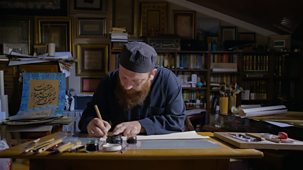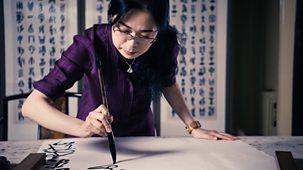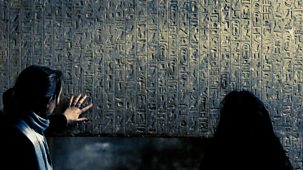
Series 1: 3. Changing the Script
The written word is so important in everyday life that there can be few more radical acts than forcing an entire nation to learn a new script. Yet that is what happened in Turkey in 1928 when the founder of the modern Turkish nation, Mustafa Kemal Ataturk, decreed that the Arabic script, which had been used to write the Turkish language for more than six centuries, would be replaced by the letters of the Latin alphabet.\n\nHis motivation lay in events that happened in Europe in the 15th century, at the beginning of the modern age, when society was transformed by the invention of the printing press. Because the shape of the letters of the Latin alphabet made them easier to print than other scripts, printing took off in Europe in a way it did not elsewhere. The resulting explosion in information led to scientific and industrial revolutions that, by the early 20th century, had taken Europe to unprecedented levels of wealth and power, giving European nations the means to dominate the globe.\n\nThis link between the Latin alphabet and the rise of western industrial society resulted in leaders in other parts of the world seeing the western script as the key to modernity. Could adopting the Latin alphabet be a shortcut to mass literacy and a modern society? Certainly, by switching from Arabic to Latin letters, it was possible to write Turkish phonetically, making it easier to learn to read and write, and so tackle the disastrously low levels of literacy in the country.\n\nBut alongside the practical motivation for the change, Mustafa Kemal also had a political one. Arabic was the script of the Koran, and when he banned the use of the Arabic alphabet, it was an attempt to alter the trajectory of Turkish history away from its Islamic past towards the kind of secular, technological society that was being created in Europe.\n\nIndeed, in the 1920s, the Latin alphabet, with its promise of modernity, was on the march into central Asia, where most of the Islamic states had been absorbed by the expanding Russian Empire. Under the tsars, the languages of the region continued, however, to be written in the Arabic script.\n\nBut in 1917, the Russian Empire collapsed, and power was seized by the Communist Party. Its leader, Lenin, was determined to modernise and secularise the new Soviet Union. So, in 1929, the Soviet Union decreed the change to Latin letters in central Asia. But Lenin’s successor, Joseph Stalin, was determined to strengthen Moscow’s control and he did so by means of another script reform. In 1940, he replaced the Latin alphabet with the Russian Cyrillic alphabet. \n\nCyrillic remained the script of central Asia for five decades. But in 1991, the Soviet Union fell apart and central Asian states like Uzbekistan became independent nations. Uzbeks now had a new political identity, and there was no stronger way to signal this change than to change the script yet again. Out went Cyrillic and back came the Latin alphabet.\n\nNo country has changed its script more often in such a relatively short period as Uzbekistan. But through all these dizzying changes there has been one constant: the pull of the Latin alphabet as a means of connecting with the wider world and as a symbol of a nation that embraces modernity.\n\nIn China too, the Communist Party under Chairman Mao made a determined effort to replace the ancient Chinese pictographic script with a phonetic system based on Latin letters. But, since so much of Chinese culture and history is embodied in the characters of the Chinese writing system, this attempt ultimately failed. However, today’s technology threatens to do what even Chairman Mao could not: persuade the Chinese people to embrace the use of Latin letters.\n\nThe native script of computers is a simple binary code of ones and zeros, but in order to facilitate human interaction with computers, American computer scientists developed Ascii, the American Standard Code for Information Interchange, which allows communication with computers using human language, written in Latin letters.\n\nThis universal standard meant, for many decades, that using a computer demanded that you use the Latin alphabet, and this is how most Chinese people interact with their computers and smart phones, using a Latin-based phonetic script called Pinyin. As a result, even highly educated Chinese are losing the ability to write using Chinese characters. \n\nCould what is happening in China be the future of writing everywhere? With new ways of creating text becoming ever more popular, will there soon be any need to learn to write by hand at all? That said, there has always been more to script than language. For 5,000 years, scripts themselves have been repositories of cultural and religious identities that cannot easily be put into words. This is the hidden power, and value, of script. For, each time we pick up a pen, we express who we are in every letter we write.
Source: BBC 4
Most recent episodes of The Secret History of Writing
The Secret History Of Writing
Series 1: 3. Changing The Script
The written word is so important in everyday life that there can be few more radical acts than forcing an entire nation to learn a new script. Yet that is what happened in Turke ...
26-05-2024
BBC 4
The Secret History Of Writing
Series 1: 2. Words On A Page
In 1448, in Mainz, Germany, a goldsmith named Johannes Gutenberg was experimenting with a lead alloy and a hand-held mould. His aim was to speed up the process of putting ink on ...
19-05-2024
BBC 4
The Secret History Of Writing
Series 1: 1. From Pictures To Words
We take it for granted, but every time we pick up a pen, we are employing the most powerful technology ever invented: the technology of writing. The invention of writing about 5 ...
12-05-2024
BBC 4
Most popular episodes of The Secret History of Writing
The Secret History Of Writing
Series 1: 2. Words On A Page
In 1448, in Mainz, Germany, a goldsmith named Johannes Gutenberg was experimenting with a lead alloy and a hand-held mould. His aim was to speed up the process of putting ink on ...
19-05-2024
BBC 4
The Secret History Of Writing
Series 1: 1. From Pictures To Words
We take it for granted, but every time we pick up a pen, we are employing the most powerful technology ever invented: the technology of writing. The invention of writing about 5 ...
12-05-2024
BBC 4
The Secret History Of Writing
Series 1: 3. Changing The Script
The written word is so important in everyday life that there can be few more radical acts than forcing an entire nation to learn a new script. Yet that is what happened in Turke ...
26-05-2024
BBC 4



